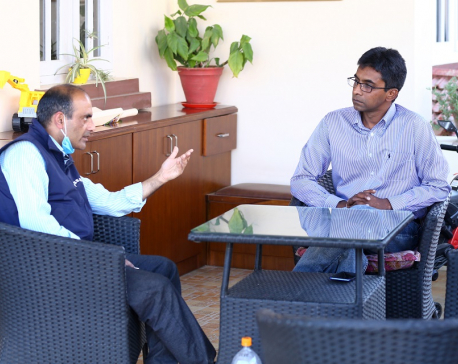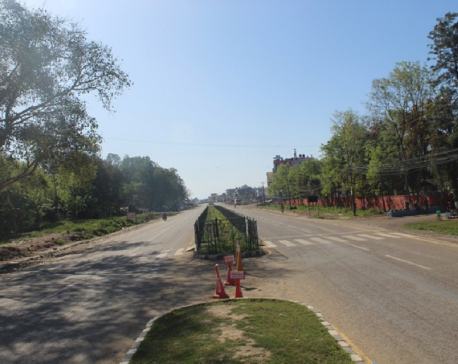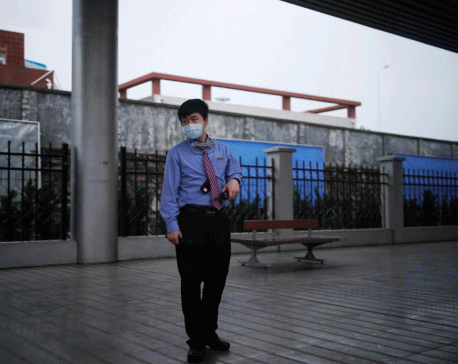
OR

Irina Aryal
The author is pursuing her M.Phil. in education at Kathmandu University.news@myrepublica.com
More from Author
The lockdown imposed to control the highly contagious COVID-19 has been extended yet another time till June 14. As the viral infection has been increasingly affecting people across the country - even taking their lives - it is uncertain how long this order of home confinement will continue. The uncertainty is all the more telling in the education sector, which is expected to be the last one to open even if the movement restriction is lifted.
Online education and distance learning are being used to continue education remotely in this turbulent time. Although affordability and practicality of online education is a highly debatable topic in the Nepali context, schools and universities are increasingly adopting remote pedagogy to keep up with the academic calendar and engage the students with learning activities.
The online platform being used practices homogeneous pedagogy that is very challenging to cater to the education needs of slow learners. Due to the paucity of research on the slow learners in Nepal, the population and other contextual characteristics and causes of slow learning is yet to be discerned.
Researchers in different counties have found that slow-learning students make up around 18 percent of the total school population. Their natural aptitude to learn is different from normal students with their attention span relatively short but all of them are not intellectually disabled. The slow learners are said to be having low self-esteem and showing symptoms of depression. Conducive learning environment at school and home, personalized pedagogies and special attention from the teachers, persistent encouragement and support from the parents significantly increases the chances for slow learners to attain scholastic achievements like their peers.
Nevertheless, in the context of this pandemic and remote pedagogies being increasingly used, the slow learners are left behind in the learning process. They are unable to understand the instructions directed through the virtual platform. They need constant and continuous engagement, love and motivation, different approaches, sometimes improvisations and innovative teaching techniques to take them along. The online platforms have limited capacity for the purpose and slow learners’ meaningful participation and effective learning cannot be ensured.
In this context, the remote pedagogy also needs to include parents of slow learners during the online session. Moreover, school and parent collaboration is imperative to keep the slow learners’ academic outcome on the track. Additionally, volunteers and retired teachers in the community can also contribute to the education of slow learners, keeping them in small groups, maintaining social distancing and adopting due safety measures.
Furthermore, they don't need to be taught the educational course in such hard times. They can read story books or watch inspirational and motivational movies with family members and play educational games such as word or math puzzles. They can learn the life skills, engaging them in household chores, agricultural activities, religious and cultural rituals at home. This will help them keep happy and motivated and will yield positive outcomes in learning as well.
No one knows when formal schooling will resume. In this context, students’ learning can be based on the concept of schooling as coined by John Halt, an American educationist. Engage your child in household activities, gardening, mound manner and discipline, and teach them cultural identity and its importance instead of imposing new things on them through online platforms alien to their cognition.
You May Like This

No better option than lockdown to contain coronavirus infection: Dr. Jha
KATHMANDU, April 4: Dr. Rajib Jha has said there is no better option than lockdown to contain coronavirus. Sharing the... Read More...

Seventh day of lockdown; Birendranagar wears deserted look (with photos)
BIRENDRANAGAR, March 30: As the country is already in the seventh day of nationwide lockdown enforced by the government, capital... Read More...

China's Hubei eases coronavirus curbs; new imported cases decline
XIANNING, China, March 25: Life started to return to normal on Wednesday after two months of lockdown in Hubei province,... Read More...





Just In
- CM Kandel requests Finance Minister Pun to put Karnali province in priority in upcoming budget
- Australia reduces TR visa age limit and duration as it implements stricter regulations for foreign students
- Govt aims to surpass Rs 10 trillion GDP mark in next five years
- Govt appoints 77 Liaison Officers for mountain climbing management for spring season
- EC decides to permit public vehicles to operate freely on day of by-election
- Fugitive arrested after 26 years
- Indian Potash Ltd secures contract to bring 30,000 tons of urea within 107 days
- CAN adds four players to squad for T20 series against West Indies 'A'












Leave A Comment